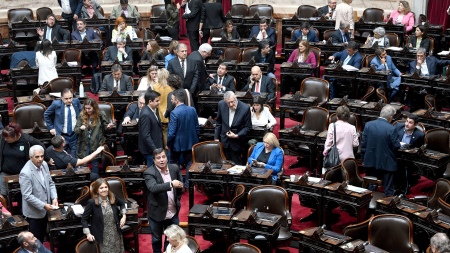The Government is advancing in the elaboration of a bill to compensate the Treasury for the extra funds that the City of Buenos Aires can claim after the Supreme Court ruling that ordered the national State to implement an increase in the co-participating mass of the district, estimated at around $200 billion.
The objective is for the initiative to be treated together with other projects pending treatment, such as money laundering, the agribusiness law, the regulatory framework to provide stability to investments in Liquefied Natural Gas and hydrogen, and the creation of new universities. that could not be dealt with in the last session of the year because the quorum was not reached.
At the Palacio de Hacienda they estimate that the extra collection needed to cover these extra funds, which are not contemplated in the 2023 Budget, would be around $200,000 million.
At the Palacio de Hacienda they estimate that the extra collection needed to cover these extra funds, which are not contemplated in the 2023 Budget, would be around $200,000 million.
What remains to be defined are the tools that will be used to obtain these funds, which will be of a tax nature.
This Tuesday, after the initial rejection formulated by the Government to the decision of the Court, the decision to transfer TX31 bonds to the City of Buenos Aires was made official, through administrative decision 1282/2022 of the Cabinet Office.
“In response to the precautionary measure issued in the Judicial File cited in the Visto, the National State has decided to seek the possible remedy in the current circumstances, while the substantive issue is resolved or the Honorable National Congress enacts a law to provide for in the budget the attention of the judicial measure ordered”, maintains the administrative decision in the recitals.
The objective is for the initiative to be dealt with along with other pending projects, such as money laundering, the agribusiness law, the regulatory framework for investments in Liquefied Natural Gas and hydrogen, and the creation of new universities.
On the eve also, in two letters that bear the signature of the Treasury Attorney, Carlos Zannini, the Government filed a revocation “in extremis” so that the Court annuls the precautionary measure issued on December 21 and demanded that the members of the highest court excuse themselves from intervening so that the presentation can be analyzed by judges who had not participated in the questioned decision.
For his part, the Buenos Aires government rejected the proposed payment mechanism through bonds and also filed a criminal complaint in the federal courts of Comodoro Py against officials of the National Executive Power whom he accused of not complying with the Court’s ruling.
In the Palacio de Hacienda they describe as “very rare” the decision of the Court to order the national Government to implement an increase in the co-participating mass of the district.
They warn that it is rare for the Supreme Court to issue a precautionary measure without resolving the underlying issue, without looking at how the rest of the provinces think
As an example, they pointed out that To modify the co-participation, the 23 provinces need a federal agreement, an understanding between all the parties. While the City of Buenos Aires at the time was modified the co-participation without the intervention of the rest of the provinces.
“If it is a jurisdiction that enters the co-participating mass, it is in the group of the rest of the jurisdictions. This is not foreseen in the ruling and it is a huge problem going forward, because we can spend the next 20 years with a President who raises it or deregistration without consulting other jurisdictions,” they say.
In this regard, they add that it is rare for the Supreme Court to issue an injunction without resolving the underlying issue, without considering how the rest of the provinces think.








